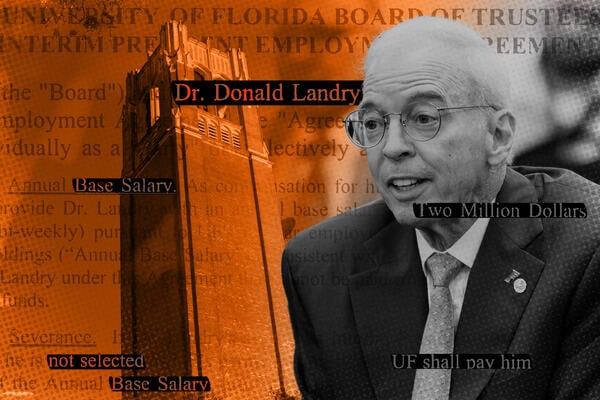
Florida Finalizes Interim President Hire
The Florida Board of Governors unanimously approved Donald Landry on Thursday as interim president of the University of Florida, three months after it rejected Santa Ono for the job in a split vote.
Landry, who has a lengthy academic résumé but has never been a college president, will now be among the top-paid campus leaders in the country, with a base salary of $2 million and the potential to earn an additional $500,000 in bonuses. But the one-year contract also includes an unusual caveat: Landry will earn $2 million in severance pay if he is not selected for the permanent job.
Such a guarantee is an anomaly for an interim president, one expert said.
The Interview
Landry’s interview with the Board of Governors Thursday was much less contentious than Ono’s.
The board grilled Ono, who resigned as president of the University of Michigan to pursue the top job at UF, for almost three hours, mostly over his past support of diversity, equity and inclusion initiatives, which he sought to distance himself from ahead of the interview.
But on Thursday, it was clear from the outset that board members liked what they saw in Landry.
Prior to the vote, University of Florida Board of Trustees chair Mori Hosseini ticked off Landry’s accomplishments, noting he is a celebrated physician and academic. Hosseini also highlighted his various roles, such as chair emeritus of the Department of Medicine at Columbia University and president of the American Academy of Sciences and Letters, as well as his prior experience on the President’s Council on Bioethics during the George W. Bush administration, among other achievements.
“We are excited to see what UF can accomplish under his leadership,” Hosseini told the board.
The statewide Board of Governors also seemed excited about the candidate, approving his hire after an interview of around 30 minutes, which included more complimentary remarks from members praising Landry for his leadership in the health field and for filing an amicus brief supporting Florida and Texas officials in a Supreme Court case last year. In that brief, Landry argued against content moderation efforts on social media platforms, which he cast as censoring alternative perspectives and “suppressing dissent on a host of scientific questions.”
Paul Renner, a former Republican lawmaker and current gubernatorial candidate, told Landry, “In addition to your remarkable academic record, it strikes me as unique that I don’t know anyone else in academia that’s filed an amicus brief to the Supreme Court in defense of free speech.”
Renner also asked how Landry would defend free speech at UF.
Landry answered that beyond academic freedom and free speech, there “is a right to teach and a right to learn.” He said he would prevent disruptions to “the teaching functions of the university” by emphasizing time, place and manner restrictions “as significant as necessary but as small as possible” to balance free speech with UF’s mission. Landry also emphasized the importance of inculcating a culture of civility and the need for UF students and faculty to buy in.
At another point in the interview, Landry expressed concerns about “ideological pressure” to “not speak to certain topics,” specifically referring to climate change. He argued that climate activism has suppressed the free discussion of science, which Landry said “is not settled in that area.”
The Contract
One expert noted that several parts of Landry’s contract stand out as unusual—starting with severance pay if he’s denied the permanent job in a year.
“I’ve never seen a guarantee of any type given to an interim,” said Judith Wilde, a research professor at George Mason University who studies presidential searches and contracts.
The salary itself is also quite substantial, especially for an interim president, she said. Ono was set to make around $3 million a year, which Wilde suspects the next permanent president will also get.
“Given the way that Santo Ono was treated in Florida, they may have been fearful that it would be difficult to get anybody to come. So they’ve advertised, in a sense, that they are still willing to give a big salary,” Wilde said. “Whoever steps into that job will probably get at least $3 million.”
Wilde also said that the key duties and responsibilities listed in Landry’s contract are highly prescriptive compared to other contracts, which don’t spell out specifics to the same level of detail. Among other duties, Landry is directed to appoint a permanent provost, fill interim dean positions and other vacant leadership roles, and “accelerate efforts” to encourage “Jewish students who feel threatened or harassed at other institutions to apply for admission.”
He is also instructed to “work with Florida and Federal [Department of Government Efficiency] to eliminate waste, fraud, and abuse”—a provision that has appeared in other presidential contracts. (While Ono’s contract also included that provision, it was less prescriptive over all.)
Several of the key duties and responsibilities, including certain hiring decisions, require the approval of UF’s board chair, which Wilde said would grant significant power to Hosseini.
“In essence, it makes him a co-president,” Wilde said.
Source link



